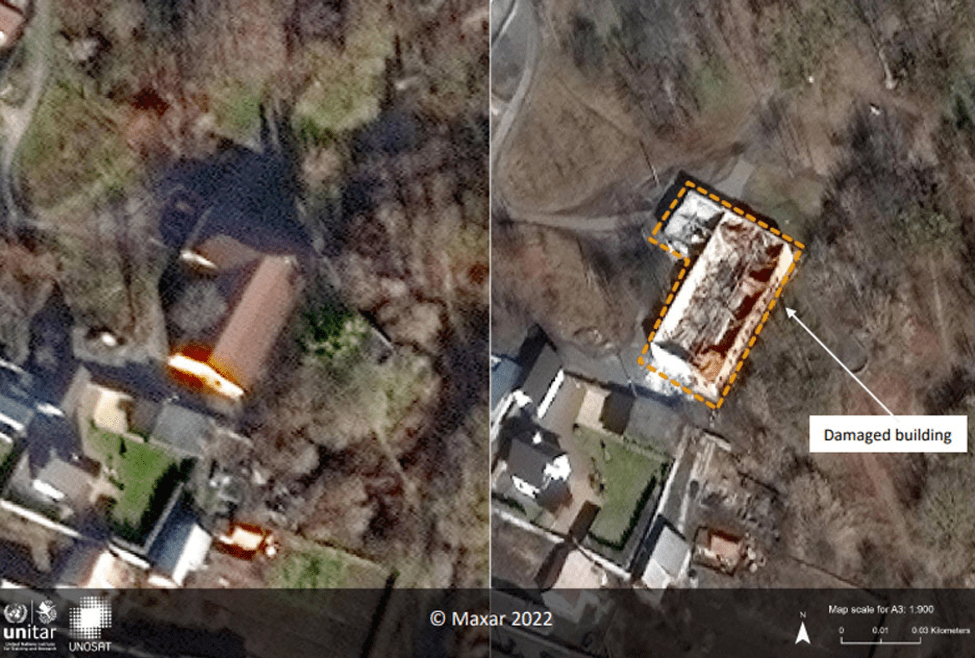Reflections from the 51st Annual Conference of the Canadian Council of International (October 27-28, 2022, Ottawa)
By: Idil Atak, Jennifer Orange, Uchechukwu Ngwaba, Hilary Evans Cameron
I Introduction (Idil Atak)
Our panel was entitled “Solidarity and Enlightened Self Interest in International Law: Lessons Learned from Russia’s Invasion of Ukraine”. We explored the topic from the perspective of three different legal areas: the protection of cultural heritage, the right to health, and refugee protection. The common thread running through our presentations is the importance of human rights for peace and justice.
I would like to take a moment to talk about an opinion piece by Dr. Chile Eboe-Osuji, a former judge and President of the International Criminal Court in The Hague, published in the Canadian Review of International Law and Policy (CRILP) Blog launched in October 2022. Dr. Eboe-Osuji argues that the invasion of Ukraine occurred partly because the international community has not managed to make wars of aggression sufficiently risky for the world’s warlords. According to him, the solution involves enhancing the risk of criminal prosecution for the crime of aggression – which would involve the amendment of the Rome Statute of the International Criminal Court. The second concrete suggestion by Dr. Eboe-Osuji is to enhance personal civil liability for warlords through a new international treaty that would establish peace as an actionable fundamental human right. In his opinion piece, Dr. Eboe-Osuji also addresses the objections to recognizing the right to peace and explains, for instance, how such a right would not impede the right of States to self-defence. This forward-looking piece outlines concrete suggestions to deter and punish wars of aggression while emphasizing the importance of international law in achieving peace and justice.
II Protecting Ukrainian Cultural Heritage: practicing the norms of international law (Jennifer Orange)

Source: Unitar & Unisat (Universal Satellite Communications, Inc.)
When Russia invaded Ukraine in February 2022, many people doubted the relevance of international law. The strong military response of the international community of states, and of NATO states in particular, is one indicator that international law continues to be respected and relevant. In this talk, I looked at another indicator—the remarkable actions of the international heritage sector.
Within days of the invasion, Russia had destroyed major Ukrainian cultural sites, such as the Ivankiv Historical and Local History Museum, which was destroyed on February 25th, 2022 – one day after the invasion began. This museum contained the treasured collection of 25 works by the Ukrainian folk artist Maria Prymachenko. As of October 24th, 2022, UNESCO counts 207 damaged sites. The destruction and pillage of cultural objects and sites during armed conflict may violate several international instruments, such as the 1954 Hague Convention on the Protection of Cultural Property in the Event of Armed Conflict, the Geneva Conventions and the Rome Statute.
Since the invasion, individual museums and their associations have engaged in practices that support the protection of heritage objects and heritage professionals in the name of international law. In this talk, I described the ways that museums are working to identify important Ukrainian cultural objects and sites; protect those sites from being damaged; monitor the damage caused by Russian forces; and create exhibitions around the world that educate visitors about the threat to Ukraine and the beauty of Ukrainian culture. Through these practices, the international heritage sector is validating both the relevance and necessity of international law.
III The Right to Health, Pandemic Response, and the Ukrainian Conflict: Implications for International Solidarity (Uchechukwu Ngwaba)

I raised three questions in my talk: (1) What obligations can we infer from existing normative instruments on the right to health to ground the responsibility of states involved in armed conflict (such as Russia and Ukraine) to protect and fulfil the right to health? (2) What additional responsibility does a pandemic situation present for protecting and fulfilling the right to health? (3) In situations of armed conflict where affected states are either unable or unwilling to protect and fulfil the right to health of affected populations should the international community assume those obligations based on international solidarity principles?
I suggest in response to my first question that even in situations of armed conflict states are obligated under international law to protect and fulfil the right to health of affected populations. Both international humanitarian law (IHL) which applies to armed conflict situations, and international human rights law (IHRL) which applies to all other situations create these obligations. Obligations under IHL abound in the following contexts:
- Wounded and the sick are to be protected against attempts upon their lives and violence against their person (1949 First Geneva Convention (GC I) Art 12; 1949 Second Geneva Convention (GC II) Art 12; Fourth Geneva Convention (GC IV) Art 16; 1977 First Additional Protocol (AP I) Art 10; 1977 Second Additional Protocol (AP II) Art 7).
- Willfully killing the wounded or sick or causing great suffering or serious injury to their bodies or to their health constitutes war crimes as grave breaches of the Geneva Convention (GC I, Art 50; GC II, Art 51).
- Wounded and sick are to be searched for and collected by parties to an armed conflict (GC I, Art 15; GC II, Art 18; AP II, Art 8).
- Wounded and sick must be protected from pillage and ill-treatment (GC I, Art 15; GC II, Art 18; GC IV, Art 16; AP II, Art 7 and 8).
- Wounded and sick must be treated without discrimination; if distinctions are to be made, it should be because of their medical condition (GC I, Art. 12; GC II, Art. 12; AP II, Art. 7(2)).
Equally so, IHRL creates additional obligations as seen under Art. 12 of the International Covenant on Economic, Social and Cultural Rights (ICESCR) which requires states to take steps to ensure the right of everyone to the enjoyment of a variety of facilities, goods, services, and conditions necessary for the realization of the highest attainable standard of physical and mental health (the right to health). Additionally, General Comment No. 14 of the Committee on Economic, Social and Cultural Right (CESCR) – the UN human rights treaty monitoring body comprising independent experts that monitor the implementation of the ICESCR – states that the right to health contains the core obligations to maintain essential primary care, access to minimum essential food, basic shelter, housing and sanitation, and an adequate supply of safe and potable water, as well as the obligation to provide essential drugs. These core obligations are non-derogable and require states to respect, protect and ensure the right to health. There are other international law guarantees of the right to health such as Art. 25 of the Universal Declaration of Human Rights which provides for the right to medical care; the right of access to health care is articulated in several instrument (such as Convention on the Elimination of All Forms of Discrimination Against Women Arts 11(1)(f), 12 and 14(2)(b); International Convention on the Elimination of All Forms of Racial Discrimination Art 5(e); Convention on the Rights of the Child Art 24; Convention of the Rights of Persons with Disabilities Art 43(e) and 45(c) etc).
With respect to my second framing question, I suggest that the current Covid-19 pandemic is a harbinger of the future of international public health challenges, the consequences of which are exacerbated by the impacts of armed conflicts. The Covid-19 pandemic has amply demonstrated how infectious diseases can morph into more virulent strains with increased lethal capacity. The international containment of infectious diseases is severely constrained by state insecurity, political instability, terrorism, repression, human rights abuses, and displacement of citizens by armed conflict. Immediate and intergenerational consequences are not limited to the outbreak or public health ramifications thereof, but include environmental determinants of health impacted by conflict, such as destruction of homes, congestion and inadequate sanitation, community fragmentation, homelessness, poverty and poor nutrition, all of which compromise individual and community resilience and health protective behaviours.
All of these lead to the third point I make in response to my third framing question, namely, international solidarity is required now more than ever to tackle these great challenges confronting the human family. I adopt the definition of international solidarity offered by the First UN Independent Expert on Human Rights and International Solidarity, Rudi Mohammed Rizki, who defines the term as: “…the union of interests, purpose and actions among States and social cohesion between them, based on the interdependence of States and other actors to preserve the order and very survival of international society, and to achieve common goals that require international cooperation and collective action.” I make the following concluding observations:
- In order to preserve the order and very survival of international society, and to achieve common goals that require international cooperation and collective action we need to deepen normativity around protecting and fulfilling the right to health of populations affected by armed conflict (especially during a pandemic) through humanitarian interventions based on solidarity where the affected states are UNABLE to do so.
- Conversely, in situations where the affected states involved in armed conflict are UNWILLING to protect and fulfil the right to health, existing normative instruments of IHL should be invoked to characterize such behaviours as war crimes for which international criminal consequences should follow.
IV Fact-finding in International Refugee Law: Lessons from the Russian Invasion of Ukraine (Hilary Evans Cameron)

In the first months after the Russian invasion, many countries that rightly welcomed Ukrainian refugees worked equally hard to keep other refugees at bay. What can we learn from this? Nothing that we did not already know. The people responsible for offering refugee protection may be more motivated to protect some refugees than others. They may be motived to protect some refugees and not others. And they may not be motivated to protect any refugees at all. If they have the discretion, either in fact or in law, to decide who they want to protect, they may use that discretion unjustly.
Canadian refugee status decision-makers have long had this discretion, both as a matter of fact and as a matter of law, which helps to explain the persistent wide disparities in their grant rates. In a Canadian refugee hearing today, on any given set of allegations and evidence, an adjudicator can very often decide to accept or deny the claimant fully at their own discretion, for whatever reasons that motivate them, while keeping entirely within the legal constraints. This is because Canadian refugee law allows decision-makers to choose whether to resolve their doubts in the claimant’s favour or at their expense. At the end of the day, a decision-maker can say “I just don’t know what to believe, so I’m accepting your allegation” or “I just know what to believe, so I’m rejecting your allegation.” To reach either conclusion, all they need is doubt. And when the claimant is testifying through an interpreter, across a language and cultural barrier, in a manner often complicated by trauma, and typically with little to no supporting evidence, doubt is not hard to come by.
The drafters of the 1951 Refugee Convention left a crucial question unanswered: how should refugee status decision-makers prefer to err? The law of fact-finding, the law that is supposed to constrain how decision-makers resolve their doubts, depends on the answer to this question. International law must loudly declare that it is a worse mistake, and by orders of magnitude, to reject a claim than should have been accepted than to accept a claim that should have been denied. Providing this missing piece to the law’s normative foundations will not solve the problem of discretion. But we cannot hope for consistently just and principled refugee status decision-making without it.

Idil Atak
Lincoln Alexander School of Law
Areas of Expertise: Irregular migration, refugee protection, securitization of migration and human rights law
Idil Atak is an associate professor at the Lincoln Alexander School of Law. Dr. Atak holds a PhD from the Université de Montréal’s Faculty of Law. The former editor-in-chief of the International Journal of Migration and Border Studies (IJMBS), she is a past president of the Canadian Association for Refugee and Forced Migration Studies (CARFMS). Her research interests include irregular migration, the criminalization of migrants, and the protection of the rights of irregular migrants, asylum seekers and refugees in Canada and in Europe. Dr. Atak served as a legal expert for the Turkish Ministry of Foreign Affairs in Ankara, then as deputy to the Permanent Representative of Turkey to the Council of Europe in Strasbourg, France.

Jennifer Orange
Lincoln Alexander School of Law
Areas of Expertise: Human rights, international law, organizational theory, dispute resolution, socio-legal studies, museology
Jennifer Orange is an assistant professor at the Lincoln Alexander School of Law where she teaches International Human Rights Law. Professor Orange is a lawyer, adjudicator, and human rights scholar. She received her S.J.D. from the University of Toronto, her LL.M. from New York University (International Legal Studies), her LL.B. from the University of Toronto, and her B.A. in Asian and Middle Eastern Studies from the University of Pennsylvania. Her research investigates the relationship of cultural institutions with new developments in both international and domestic human rights law. She is passionate about the potential for partnerships between cultural and legal institutions in the work to prevent, and recover from, human rights violations. She has written and lectured on international law, human rights, the law of armed conflict and the role of museums. She is a Senior Fellow at the Bill Graham Centre for Contemporary International History, a member of the Advisory Board of the Canadian Centre for the Responsibility to Protect and a member of the Canadian Human Rights Tribunal.

Uchechukwu Ngwaba
Lincoln Alexander School of Law
Areas of Expertise: Public health and human rights, international human rights law, health systems, health governance frameworks, constitutional theory, comparative constitutional law, and transitional justice
Assistant Professor Uchechukwu Ngwaba teaches public international law in Lincoln Alexander School of Law. His research program engages multi-disciplinary, comparative and socio-legal methods in exploring complex questions affecting health governance frameworks in the Global North and South. His latest research project which is funded by a SSHRC Explore Grant sets out to embed a regional framework for health governance in the Inter-American Human Rights System. Prof Ngwaba’s work in transitional justice engages TWAIL as a useful theoretical lens for critical internationalism to interrogate claims about universalism in the pursuit of international criminal justice, whilst pushing for better representation for the subaltern in international thought and action.

Hilary Evans Cameron
Lincoln Alexander School of Law
Areas of Expertise: Refugee law; administrative law; memory; risk perception; lie detection; logic and legal reasoning; clinical legal education
Assistant Professor Hilary Evans Cameron teaches evidence law, administrative law, and advanced legal research and writing at the Lincoln Alexander School of Law. A former litigator, she represented refugee claimants for a decade and holds a doctorate in refugee law from the University of Toronto. Her research largely focuses on credibility assessment in the refugee law context. She is the author of a book about the law of fact-finding in refugee status decision-making (Refugee Law’s Fact-finding Crisis: Truth, Risk, and the Wrong Mistake, Cambridge 2018) that explores the normative foundations of the 1951 UN Refugee Convention and its ‘non-refoulement’ principle.
